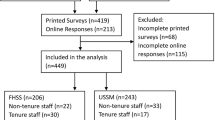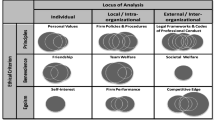Abstract
This study aimed to determine what types of ethical climates are perceived by 256 faculty members who worked in Hashemite University-Jordan, using the Ethical Climate Questionnaire. The results revealed that perceived organizational ethical climate in order were egoistic (M = 4.29, SD = .48), utilitarian (M = 3.45, SD = .51), and deontological (M = 3.04, SD = .53). There were no significant differences among faculty members regarding their gender and academic rank. The researcher recommended that future research should be conducted on the types of ethical climates in different universities and different variables.
Similar content being viewed by others
References
Al-Omari, A., Khasawneh, S., & Abu Tineh, A. (2009). Academic and applied campus climate as perceived by faculty members at Jordanian universities: Comparative study. Damascus University Journal, 25(3+4), 495–530.
Blewett, T. J., Keim, A., Leser, J., & Jones, L. (2008). Defining a transformation education model for the engaged university. Journal of Extension, 46(3), 1–4.
Campbell, J. R. (1995). Reclaiming a lost heritage: Land-grant and other higher education initiatives for the twenty-first century. Michigan State: Lansing.
Cullen, J. B., Parboteeah, K. P., & Victor, B. (2003). The effects of ethical climates on organizational commitment: A two-study analysis. Journal of Business Ethics, 00, 1–15.
Cullen, J. B., Victor, B., & Bronson, J. W. (1993). The ethical climate questionnaire: An assessment of its development and validity. Psychological Reports, 73, 667–674.
Donaldson, T., & Dunfee, T. W. (1994). Toward a unified conception of business ethics: Integrative social contracts theory. Academy of Management Review, 19(2), 252–284.
Falkenberg, L., & Woiceshyn, J. (2008). Enhancing business ethics: Using cases to teach moral reasoning. Journal of Business Ethics, 79, 213–217.
Felicio, D. M., & Pieniadz, J. (1999). Ethics in higher education: Red flags and grey areas. Feminism and Psychology, 9(1), 53–73.
Fiol, C. M., & Lyles, M. A. (1985). Organizational Learning. Academy of Management Review, 10(4), 803–813.
Forte, A. (2004). Business Ethics: A study of the moral reasoning of selected business managers and the influence of organizational ethical climate. Journal of Business Ethics, 51, 167–173.
Grunewald, D. (2008). The Sarbanes-Oxley Act will change the governance of non-profit organizations. Journal of Business Ethics, 80, 399–401.
Holland, B. (2001, March). Exploring the challenge of documenting and measuring civic engagement endeavors of colleges and universities. Paper presented at the Campus Compact Advanced Institute on Classifications for Civic Engagement. http://www.compact.org/advacedtoolkit/measuring.html. Accessed 15 Sep 2010.
Iverson, S. V. (2008). Now is the time for change: Reframing diversity planning at Land- Grant Universities. Journal of Extension, 46(1), 1–11.
Jurkiewicz, C. L., Giacalone, R. A., & Knouse, S. B. (2004). Transforming personal experience into a pedagogical tool: Ethical complaints. Journal of Business Ethics, 53, 283–295.
Kagan, S. (1998). Normative ethics. Boulder: Westview.
Kelley, P. C., & Chang, P. L. (2007). A typology of university ethical lapses: Types, levels of seriousness, and originating location. The Journal of Higher Education, 79(4), 402–429.
Marnburg, E. (2000). The behavioral effects of corporate ethical codes: Empirical findings and discussion. Business Ethics: A European Review, 9(3), 200–210.
Martin, K. D., & Cullen, J. B. (2006). Continuities and extensions of ethical climate theory: A meta-analytic review. Journal of Business Ethics, 69, 175–194.
Moore, G. (2006). Managing ethics in higher education: Implementing a code or embedding virtue? Business Ethics: A European Review, 15(4), 407–418.
Parboteeah, K. P., Hoegl, M., & Cullen, J. B. (2008). Ethics and religion: An empirical test of a multidimensional model. Journal of Business Ethics, 80, 38–398.
Ruppel, C. P., & Harrington, S. J. (2000). The relationship of communication, ethical work climate, and trust to commitment and innovation. Journal of Business Ethics, 25, 313–328.
Schein, E. (2004). Organizational culture and leadership. San Francisco: Jossey-Bass.
Shaw, W. H. (2008). Marxism, business ethics, and corporate social responsibility. Journal of Business Ethics, 84, 565–576.
Stevens, B. (2008). Corporate ethical codes: Effective instruments for affecting behavior. Journal of Business Ethics, 78, 601–609.
Trevino, L. K., Butterfield, K. D., & McCabe, D. L. (1998). The ethical context in organizations: Influences on employee attitudes and behaviors. Business Ethics Quarterly, 8(3), 447–476.
Trevino, L. K., & Nelson, K. A. (2007). Managing business ethics: Straight talk about how to do it right (4th ed.). Hoboken: Wiley.
Trevino, L. K., & Weaver, G. R. (2003). Managing ethics in business organizations. Stanford: Stanford.
Van Sandt, C. (2001). An examination of the relationship between ethical work climate and moral awareness. Blacksburg: Virginia Polytechnic Institute and State University.
Victor, B., & Cullen, J. B. (1988). The organizational bases of ethical work climates. Administrative Science Quarterly, 33, 101–125.
Weber, J. (1993). Institutionalizing ethics into business organizations: A model and research agenda. Business Ethics Quarterly, 3(4), 419–436.
Author information
Authors and Affiliations
Corresponding author
Ethical Climate Questionnaire
Ethical Climate Questionnaire
The following questions will ask you about the general climate of your university. Please indicate the extent to which you feel the following statements are true about your university
Items | Strongly agree 5 | Agree 4 | Neutral 3 | Disagree 2 | Strongly disagree 1 | |
|---|---|---|---|---|---|---|
I-Egoistic | ||||||
1 | In this university, people are out for themselves | |||||
2 | People are expected to further the university’s interest | |||||
3 | There is no room for one’s own personal morals or ethics in this university | |||||
4 | Work is considered sub-standard only when it hurts the university’s interests | |||||
5 | In this university, people protect their own interest above other considerations | |||||
6 | People are concerned with the university’s interest | |||||
7 | Decisions are primarily viewed in terms of contribution to profit | |||||
8 | People in this university are very concerned about what is best for themselves | |||||
II- Deontological | ||||||
9 | It is very important to follow strictly the university’s rules and procedures here | |||||
10 | The first consideration is whether a decision violates any law | |||||
11 | People are expected to comply with the law and professional standards over and above other considerations | |||||
12 | Everyone is expected to stick by university rules and procedures | |||||
13 | Successful people in this university go by the book | |||||
14 | In this university, people are expected to strictly follow legal or professional standards | |||||
15 | Successful people in this university strictly obey the university policies | |||||
16 | In this university, the law or ethical code of theft profession is the major consideration | |||||
III- Utilitarian | ||||||
17 | In this university, people look out for each other’s good | |||||
18 | The most important concern in this university is each person’s sense of right and wrong | |||||
19 | In this university, our major concern is always what is best for the other person | |||||
20 | Our major consideration is what is best for everyone in this university | |||||
21 | It is expected that you will always do what is right for the students and public | |||||
22 | People are very concerned about what is generally best for employees in the university | |||||
23 | What is best for each individual is a primary concern for this university | |||||
24 | The effect of decisions on the students and the public are a primary concern in this university |
Rights and permissions
About this article
Cite this article
AL-Omari, A.A. The Perceived Organizational Ethical Climate in Hashemite University. Asia-Pacific Edu Res 22, 273–279 (2013). https://doi.org/10.1007/s40299-012-0033-1
Published:
Issue Date:
DOI: https://doi.org/10.1007/s40299-012-0033-1




